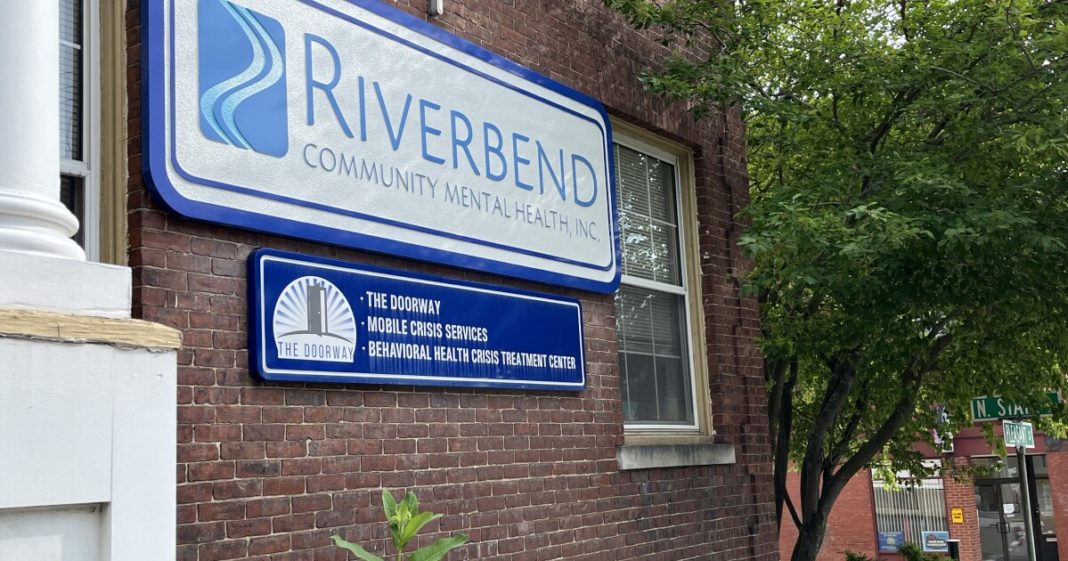Riverbend Community Mental Health plans to shut down a counseling program that serves more than 300 people by the end of the summer, citing financial pressures.
The Concord-based nonprofit says its outpatient program for adults – known as Riverbend Counseling Associates – will close Aug. 16. The organization says it isn’t cutting any other services.
“It’s quite heartbreaking, actually, to need to close this program, because we know it has been a valuable service to the community,” Riverbend President and CEO Lisa Madden said.
This comes as mental health care in New Hampshire is already stretched thin, and some therapists have months-long waitlists. Madden said Riverbend wanted to give clients time to process the change and work with their counselors on a transition plan.
“We do have people that are prepared to help with that,” she said.
Madden said the counseling program, which has been around in some form for decades, has been operating at a loss of around $1 million per year because of low reimbursement rates from insurers.
Riverbend has kept the program afloat with revenue from other services. But over the past year, Madden said the organization has seen a sharp rise in uncompensated care costs, as many clients have lost Medicaid coverage.
That’s strained the mental health center’s budget and made it impossible to keep the counseling program going, Madden said.
“The combination of the two has spiraled quickly since the unwind [of rules that kept people on Medicaid through the pandemic], and has put us in a position that we haven’t had to be in in decades,” she said.
As a community mental health center, Riverbend largely serves clients whose symptoms are serious enough to qualify for state-funded mental health services. Riverbend Counseling Associates is a separate program and typically sees clients who don’t fall into that category.
Madden said some counseling clients may be eligible for other services through Riverbend, but most will need to go elsewhere. She acknowledged the shortage of therapists in New Hampshire and nationally, but said Riverbend will help clients explore all their options, including telehealth.
“That’s why we are taking the time to be able to see what we can do to appropriately transition folks,” she said.
Medicaid losses affecting other centers, too
Rising uncompensated care costs are affecting community mental health centers across the board, according to Roland Lamy, the executive director of the New Hampshire Community Behavioral Health Association, which lobbies on behalf of the centers.
The state resumed normal Medicaid eligibility checks last year, after the expiration of pandemic-era rules that allowed people to maintain coverage despite changes in income or failing to complete the annual renewal process. Tens of thousands of Granite Staters have lost coverage as a result.
Now, Lamy said, community mental health centers are treating thousands of uninsured patients. He estimates that has translated to at least $12 million to $15 million in uncompensated care costs.
“It really is an unsustainable situation,” he told NHPR in an interview earlier this month.
Lamy said many of the people who are now uninsured are likely still eligible for Medicaid, but were confused by the renewal process or ran into other issues.
Kathy Remillard, a spokesperson for the New Hampshire Department of Health and Human Services, said the state has “worked closely” with the mental health centers to streamline the redetermination process for their patients.
“As a result, more people served by CHMCs have retained their Medicaid coverage than most other groups,” she said in an email.
She said state officials have also taken steps to boost funding for community mental health centers. That includes a one-time payment of $5 million in federal pandemic relief funding, which was recently approved by the Executive Council.
Separately, Gov. Chris Sununu has also pushed for mental health providers to get a larger share of a state fund that reimburses hospitals for uncompensated care costs. Hospitals have fought the governor on that issue, saying his proposal puts their financial viability at risk.
At Riverbend, Madden said she appreciates the state’s recent $5 million investment, but it will take more to shore up the community mental health system.
“It won’t be enough to change the trajectory of where we’re headed,” she said.


